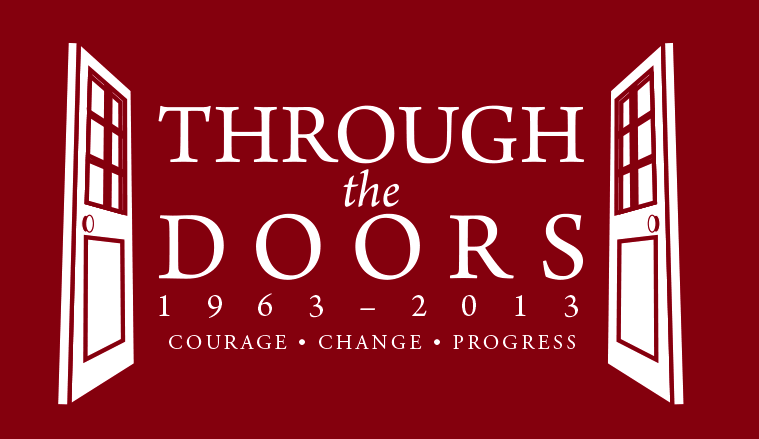UA African American Experience in 2003
The information on these pages was taken from the 2003 Opening Doors archived website.
|
Record Numbers of African-American Students
UA is currently enrolling record numbers of African-American students. For the 2002-2003 academic year, African-Americans represent 14.3 percent of the undergraduate student body and 13.3 percent of the overall student body, graduate and undergraduate. Published reports have ranked UA among the top four flagship universities in the Southeast in this category and among the nation's top 25 public flagship universities. Minority Doctoral Fellows A total of 35 SREB Minority Doctoral Fellows have enrolled at UA since the program began in 1993. UA is first in the nation in attracting students through this program that encourages minority students to pursue doctoral degrees and become college-level professors. Master's Degrees in English UA ranked 11th in the nation in number of master's degrees in English awarded to African-Americans in the 2000-2001 academic year, according to Black Issues in Higher Education. UA's national rankings for degrees awarded to African-Americans also included 44th in total doctoral degrees, 45th in doctoral degrees in education, 49th in total baccalaureate degrees, 54th in master's degrees in engineering and 59th in law degrees. College of Engineering Enrollment According to the 2001 Engineering Workforce Commission of the American Association of Engineering Societies, the UA College of Engineering ranks third in the nation among traditionally white institutions in the percentage of African-Americans enrolled. When including all historically black colleges and universities in those statistics, the College still ranks 14th in the country in percentage of African-American students. Currently, 16 percent of UA College of Engineering students are African-American. Minor in African-American Studies The Department of American Studies began offering a minor in African-American studies in 1991 under the guidance of a committee of UA faculty dedicated to expanding the University's curriculum offerings. The African-American Studies Program was established in 1997, and Dr. Amilcar Shabazz has directed the program since that time. African-American Faculty and Staff Based on fall 2002 figures, some 15.3 percent of UA's full-time faculty and staff is African-American, including 4.9 percent of the faculty and 18.5 percent of the staff. Cornelius Carter, an associate professor of dance at UA, was named the 2001-02 U.S. Professor of the Year by the Council for Advancement and Support of Education (CASE) and the Carnegie Foundation for the Advancement of Teaching. The designation is recognized as one of the nation's most prestigious awards honoring professors. Carter has taught modern dance, choreography, and jazz in The University of Alabama's College of Arts and Sciences for 11 years and also teaches and choreographs dance throughout the country. Carter, an African-American, was chosen from a group of 384 candidates representing 272 institutions of higher education. Martin Luther King Jr. Memorial Concert Each year since 1989, The University of Alabama, in conjunction with Stillman College and Shelton State Community College, has sponsored the Martin Luther King Jr. Memorial Concert. Also known as the Realizing the Dream Concert, this event — which presents some of America's best-known performers from the stage, screen, and recording studio — honors the essential legacy of Martin Luther King Jr.: nonviolent social change and an untiring struggle for freedom and justice through the transforming power of love. Past performers have included James Earl Jones, Harry Belafonte and Cicely Tyson. Minority Journalism Workshop The UA Department of Journalism in the College of Communication and Information Sciences will celebrate the 20th anniversary of its Minority Journalism Workshop July 6-17, 2003, with more than 50 high school students, former workshop directors, media professionals and alumni returning to the Capstone to take part. MJW has more than 400 graduates who have gone on to careers in prominent media outlets. The alumni returning to this year's workshop will serve as mentors to the 20 high school students chosen to participate in the workshop. Rural Health Pipeline The Rural Health Pipeline inducted its first class in 2001. The program, an extension of UA's Rural Medical Scholars program, is designed to increase the number of rural minority students who qualify for admission to medical school. Through the 10-week summer program, funded by the Robert Wood Johnson Southern Rural Access Program in Alabama and the Alabama Family Practice Rural Health Board, participants earn as many as 12 hours of college credit. Multicultural Engineering Program The College of Engineering Multicultural Engineering Program assists minority students who want to pursue careers in engineering or computer science. MEP services include pre-college counseling; enrollment counseling; tutorial assistance and counseling for enrolled students; assistance with the Cooperative Education Program; internship programs; and job placement upon graduation. MEP also assists undergraduate students applying for scholarships and other financial aid and provides information about scholarships and fellowships for graduate students. UA and Stillman College — Independent Research Top students from UA and Stillman College are conducting independent research in biology, microbiology and chemistry under a major grant from the Howard Hughes Medical Institute to the department of biological sciences in the UA College of Arts and Sciences. The two-year program includes summer research under the guidance of faculty mentors and a visiting scientist series. Multicultural Sororities UA students have formed two new sororities on campus this year. Both organizations' values emphasize diversity and multiculturalism, and both groups initiated their first members this spring. A delegation of 11 sisters of Delta Xi Phi Multicultural Sorority, including five national board members, came to UA early in May to initiate seven students into their organization. The sorority is committed to empowering women from all ethnic backgrounds, beliefs and religions. Earlier this spring, nine UA students were initiated into Alpha Delta Sigma, a local sorority also committed to diversity. |


